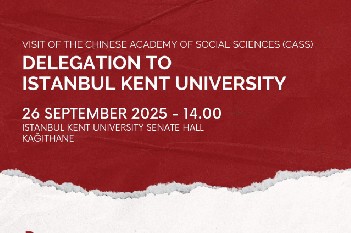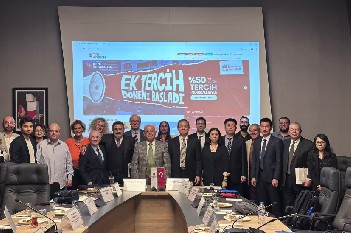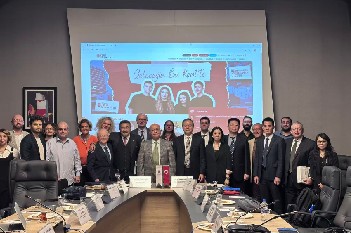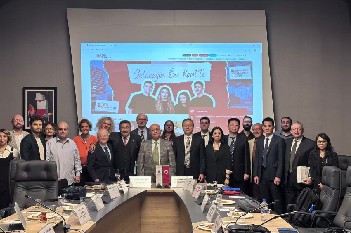Visit of the Chinese Academy of Social Sciences (CASS) Delegation to Istanbul Kent University
Date : 26.09.2025
On 26 September 2025, a delegation from the Chinese Academy of Social Sciences (CASS) visited the Kağıthane campus of Istanbul Kent University. The meeting brought together CASS delegation members, university academics, and the Vice Chairman of the Turkish-Chinese Business Development and Friendship Association. The discussions were moderated by Istanbul Kent University's Prof. Dr. Yaşar ONAY.
The programme commenced with opening remarks from the moderator, Prof. Dr. Onay, followed by addresses from the Dean of the Faculty of Economics, Administrative and Social Sciences, Prof. Dr. Hasret Çomak, and the Director of the Department of Diplomatic Studies, Prof. Dr. Liu Fenghua. The subsequent discussion focused on several key areas: China-Türkiye relations, economic cooperation within the Belt and Road Initiative (BRI) framework, overarching trends in Türkiye's political and economic development, mutual interests, and future cooperation opportunities.
Summary
The exchange provided valuable insights into bilateral relations and economic developments. Academics from both CASS and Istanbul Kent University engaged in fruitful discussions on the current state of China-Türkiye economic ties. Conversations centred on economic and diplomatic relations under the BRI, broader political and economic trends, and the challenges and opportunities impacting bilateral cooperation. While relations are strengthening, participants acknowledged that persistent structural imbalances, investment risks, and regional uncertainties continue to affect both countries. The delegation emphasised the importance of enhancing high-level political dialogue, expanding economic engagement, and deepening academic and cultural exchanges to build a sustainable foundation for cooperation.
China-Türkiye Relations
Both sides recognised the longstanding diplomatic relations between the two countries, which have expanded significantly over the past decades. A notable milestone was reached in recent years, coinciding with increased academic, diplomatic, and economic exchanges. Furthermore, China's growing influence in global governance and multilateral platforms like the Shanghai Cooperation Organisation (SCO) and BRICS presents opportunities that align with Türkiye's foreign policy objectives.
Diplomatic and Political Engagement
Türkiye-China diplomatic relations have developed steadily, marked by several key achievements. High-level leadership meetings have also been held on the sidelines of SCO and BRICS+ summits. The Chinese delegation stressed the importance of maintaining regular high-level dialogue to coordinate political and economic agendas. Türkiye's strategic location renders it a vital trade and energy transit hub connecting Europe, the Middle East, and Asia. The Turkish economy benefits from numerous Free Trade Agreements (FTAs) and an open-market framework without exchange controls. Although bilateral trade volume reached USD 48 billion in 2023, the trade imbalance remains heavily in China's favour. Substantial cooperation already exists in infrastructure, logistics, education, and humanitarian sectors, representing significant potential for further growth.
Challenges
Despite deepening cooperation, several challenges persist in Türkiye-China relations. A significant trade imbalance in China's favour remains a primary economic concern. Türkiye's economy faces volatility, including depreciation of the Turkish Lira, high inflation, and regulatory uncertainty. Chinese investors have cited risks associated with market fluctuations and frequent regulatory changes. Additionally, regional instability in the Middle East and the Gulf poses further constraints on long-term investment.
Opportunities
The discussions highlighted several opportunities for future cooperation. Infrastructure and connectivity projects, such as ports, railways, and logistics networks, are areas where the Belt and Road Initiative can play a significant role. Türkiye’s participation in multilateral platforms, such as the SCO, BRICS+, and the G20, also provides opportunities for greater communication with China. Academic and cultural cooperation, including partnerships between universities and research centres, can help foster mutual understanding and support long-term ties.
Strategic Outlook
Both delegations recognised that Türkiye-China relations are entering a phase of strategic importance. Opportunities exist to leverage Türkiye's geostrategic position alongside China's financial and technological capabilities. However, challenges such as trade deficits, investment risks, and regional instability will require careful management. The future of bilateral relations will depend on sustaining high-level dialogue, addressing trade disparities, increasing people-to-people exchanges, and developing resilient cooperation frameworks.
Türkiye and China have established a solid foundation for bilateral cooperation under the BRI. While challenges remain, particularly concerning economic asymmetries and investment confidence, both sides share a strong interest in deepening their partnership.






